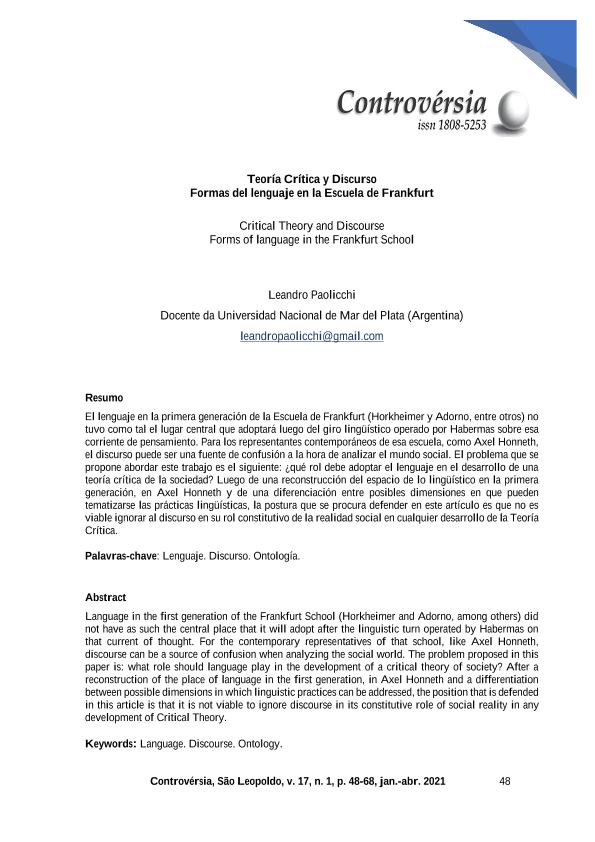Mostrar el registro sencillo del ítem
dc.contributor.author
Paolicchi, Leandro

dc.date.available
2022-09-06T13:53:31Z
dc.date.issued
2021-07
dc.identifier.citation
Paolicchi, Leandro; Teoría crítica y discurso: formas del lenguaje en la Escuela de Frankfurt; Universidade do Vale do Rio dos Sinos; Controvérsia; 17; 1; 7-2021; 48-68
dc.identifier.issn
1808-5253
dc.identifier.uri
http://hdl.handle.net/11336/167551
dc.description.abstract
El lenguaje en la primera generación de la Escuela de Frankfurt (Horkheimer y Adorno, entre otros) no tuvo como tal el lugar central que adoptará luego del giro lingüístico operado por Habermas sobre esa corriente de pensamiento. Para los representantes contemporáneos de esa escuela, como Axel Honneth, el discurso puede ser una fuente de confusión a la hora de analizar el mundo social. El problema que se propone abordar este trabajo es el siguiente: ¿qué rol debe adoptar el lenguaje en el desarrollo de una teoría crítica de la sociedad? Luego de una reconstrucción del espacio de lo lingüístico en la primera generación, en Axel Honneth y de una diferenciación entre posibles dimensiones en que pueden tematizarse las prácticas lingüísticas, la postura que se procura defender en este artículo es que no es viable ignorar al discurso en su rol constitutivo de la realidad social en cualquier desarrollo de la Teoría Crítica.
dc.description.abstract
Language in the first generation of the Frankfurt School (Horkheimer and Adorno, among others) did not have as such the central place that it will adopt after the linguistic turn operated by Habermas on that current of thought. For the contemporary representatives of that school, like Axel Honneth, discourse can be a source of confusion when analyzing the social world. The problem proposed in this paper is: what role should language play in the development of a critical theory of society? After a reconstruction of the place of language in the first generation, in Axel Honneth and a differentiation between possible dimensions in which linguistic practices can be addressed, the position that is defended in this article is that it is not viable to ignore discourse in its constitutive role of social reality in any development of Critical Theory.
dc.format
application/pdf
dc.language.iso
spa
dc.publisher
Universidade do Vale do Rio dos Sinos
dc.rights
info:eu-repo/semantics/openAccess
dc.rights.uri
https://creativecommons.org/licenses/by/2.5/ar/
dc.subject
LENGUAJE
dc.subject
DISCURSO
dc.subject
ONTOLOGÍA
dc.subject
FRANKFURT
dc.subject.classification
Filosofía, Historia y Filosofía de la Ciencia y la Tecnología

dc.subject.classification
Filosofía, Ética y Religión

dc.subject.classification
HUMANIDADES

dc.title
Teoría crítica y discurso: formas del lenguaje en la Escuela de Frankfurt
dc.title
Critical theory and discourse: forms of language in the Frankfurt School
dc.type
info:eu-repo/semantics/article
dc.type
info:ar-repo/semantics/artículo
dc.type
info:eu-repo/semantics/publishedVersion
dc.date.updated
2022-08-16T20:35:59Z
dc.journal.volume
17
dc.journal.number
1
dc.journal.pagination
48-68
dc.journal.pais
Brasil

dc.journal.ciudad
São Leopoldo
dc.description.fil
Fil: Paolicchi, Leandro. Consejo Nacional de Investigaciones Científicas y Técnicas. Centro Científico Tecnológico Conicet - Mar del Plata; Argentina. Universidad Nacional de Mar del Plata. Facultad de Humanidades. Departamento de Filosofía; Argentina. Asociación Argentina de Investigaciones Éticas. Centro Regional Buenos Aires - Sede Mar del Plata; Argentina
dc.journal.title
Controvérsia
dc.relation.alternativeid
info:eu-repo/semantics/altIdentifier/url/http://revistas.unisinos.br/index.php/controversia/article/view/21441
Archivos asociados
